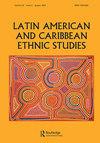White criadas and the ‘servant crisis’ in pre-abolition Rio de Janeiro
IF 1
Q4 ETHNIC STUDIES
引用次数: 0
Abstract
ABSTRACT This article interrogates the problematic relation of whiteness and servitude in mid to late-nineteenth-century Rio de Janeiro, when a fast-growing number of Portuguese female migrants, mostly from the Azorean islands, sought employment in households where domestic service had been hitherto associated with black slavery. As I argue, the accounts of elite domestic lives in popular print cultures at the time reveal a nascent narrative of ‘servant crisis’—e.g. the conviction that reliable servants were disappearing in Brazil – in reaction to the alternative work arrangements and new types of servants, which began defining domestic service over the decades leading toward the abolition of chattel slavery (1888). In fact, the vicissitudes of labor during these pre-emancipation decades set the stage for the earliest version of the ‘servant crisis’ trope that has characterized the national elites’ discourse about domesticity up to this day.废奴前的里约热内卢,白人和“仆人危机”
摘要:本文探讨了19世纪中后期里约热内卢白人与奴役之间的问题关系。当时,数量迅速增长的葡萄牙女性移民(主要来自亚速尔群岛)在家庭中寻找工作,而在此之前,家政服务一直与黑人奴隶制联系在一起。正如我所说,当时流行的印刷文化中对精英家庭生活的描述揭示了一种新兴的“仆人危机”叙事。他坚信可靠的仆人在巴西正在消失——这是对替代性工作安排和新型仆人的反应,在几十年的时间里,这种佣人开始定义家政服务,最终导致了奴隶制的废除(1888年)。事实上,在解放前的几十年里,劳动力的变迁为“仆人危机”的最早版本奠定了基础,直到今天,这个比喻一直是国家精英们关于家庭生活的话语的特征。
本文章由计算机程序翻译,如有差异,请以英文原文为准。
求助全文
约1分钟内获得全文
求助全文
来源期刊

Latin American and Caribbean Ethnic Studies
Social Sciences-Cultural Studies
CiteScore
1.30
自引率
16.70%
发文量
22
 求助内容:
求助内容: 应助结果提醒方式:
应助结果提醒方式:


